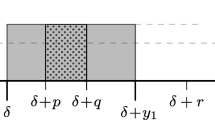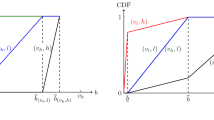Abstract
A generalization of the well-known Vickrey auctions are lottery qualification auctions–where the m highest bidders win the good with uniform probability, and pay the \(m+1\)st highest bid upon winning. A random lottery qualification mechanism decides the integer m randomly. We characterize the class of mechanisms which are payoff equivalent to the random lottery qualification auctions. The key property characterizing this class of mechanisms is one which states that only the ordinal comparison of willingness-to-pay across individuals is relevant in determining the allocation. The mechanisms can be seen as compromising between ex-post utility efficiency and monetary efficiency.
Similar content being viewed by others
Notes
This mechanism is usually understood as a hybrid of a “rationing” mechanism and an auction; see, e.g., Parlour et al. (2007).
References
Aigner M (2012) Combinatorial theory. Springer Science & Business Media, Berlin
Ashlagi I, Serizawa S (2012) Characterizing Vickrey allocation rule by anonymity. Soc Choice Welf 38(3):531–542
Atlamaz M, Yengin D (2008) Fair groves mechanisms. Soc Choice Welf 31(4):573–587
Bogomolnaia A, Moulin H (2001) A new solution to the random assignment problem. J Econ Theory 100(2):295–328
Bordley R, Harstad R (1996) Lottery qualification auctions. Adv Appl Microeconomics 6:157–183
Carbajal JC, McLennan A, Tourky R (2013) Truthful implementation and preference aggregation in restricted domains. J Econ Theory 148(3):1074–1101
Chew SH, Serizawa S (2007) Characterizing the Vickrey combinatorial auction by induction. Econ Theory 33(2):393–406
Clarke EH (1971) Multipart pricing of public goods. Public Choice 11(1):17–33
Green J, Laffont J-J (1977) Characterization of satisfactory mechanisms for the revelation of preferences for public goods. Econometrica 45(2):427–438
Groves T (1973) Incentives in teams. Econometrica 41(4):617–631
Holmström B (1979) Groves’ scheme on restricted domains. Econometrica 47(5):1137–1144
Laffont J-J, Maskin E (1980) A differential approach to dominant strategy mechanisms. Econometrica 48:1507–1520
Myerson RB (1981) Optimal auction design. Math Oper Res 6(1):58–73
Parlour CA, Prasnikar V, Rajan U (2007) Compensating for the winner’s curse: experimental evidence. Games Econ Behavior 60(2):339–356
Roberts K (1979) The characterization of implementable choice rules. In: Laffont J-J (ed) Aggregation and revelation of preferences. Elsevier, Amsterdam, pp 321–348
Rockafellar RT (1970) Convex analysis. Princeton University Press, Princeton
Roth AE, Sönmez T, Ünver MU (2004) Kidney exchange. Q J Econ 119(2):457–488
Vickrey W (1961) Counterspeculation, auctions, and competitive sealed tenders. J Finance 16(1):8–37
Vohra RV (2011) Mechanism design: a linear programming approach, vol 47. Cambridge University Press, Cambridge
Yengin D (2012) Egalitarian-equivalent Groves mechanisms in the allocation of heterogenous objects. Soc Choice Welf 38(1):137–160
Author information
Authors and Affiliations
Corresponding author
Additional information
Dedicated to John Weymark with sincere thanks.
Publisher's Note
Springer Nature remains neutral with regard to jurisdictional claims in published maps and institutional affiliations.
We are grateful to an anonymous referee for very useful comments and suggestions.
Rights and permissions
About this article
Cite this article
Chambers, C.P., Richter, M. Ordinal allocation. Soc Choice Welf 60, 5–14 (2023). https://doi.org/10.1007/s00355-020-01280-0
Received:
Accepted:
Published:
Issue Date:
DOI: https://doi.org/10.1007/s00355-020-01280-0




